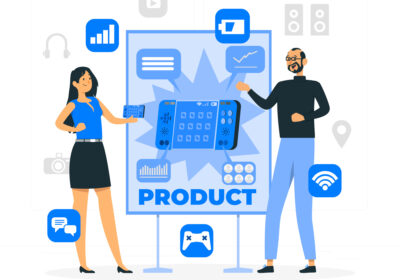To outpace competitors in the digital ecosystem, apps can be a powerful tool for businesses. This is why a mobile app development company is forced to innovate and be unique from the rest. They will have to ensure that the app serves it purpose while being insightful, engaging, content-rich and targeted at the same time. On average, a mobile user may download close to 50 apps a month. They will have expectations for the app they choose to use from hundreds of thousands of other options.
Smart apps?
Ultimately, the users expect the apps to be smart and respond in a way they like providing a personalized experience – effortless navigation, responsive interface, excellent security. To provide such a catered experience to users, the apps need to be intelligent enough to know its own intent and the desire of the users as well.
But developing one wasn’t easy a year ago. Though it isn’t particularly easy now, we do have the technology to make it a reality – artificial intelligence and machine learning.
AI/ML Advancements
AI and ML aren’t new technologies either. They have been around for a while but only recently did they evolve big enough to transform enterprises and several other sectors. Both became two heavily invested trends in a very short time, turning heads of tech behemoths like Microsoft, Google, Amazon Web Services etc.
Now we can use AI, machine learning and big data to drive innovation in a way that was only a fantasy till recently. Combining the three technologies, developers can now build intelligent apps or smart apps that have adaptive learning capabilities and human-like responses ensuring a considerably better, engaging, and more personalized user experience.
Where Azure comes in
When it comes to providing cloud-driven cognitive services, Azure and AWS dominate the market.
Though AWS is still leading, Azure adoption grew from 20% to 34% last year, reaching 60% of AWS’ market penetration.
Azure is expected to outpace AWS in the coming years, is more preferred by enterprises, and is already transforming the software development sector. Azure’s Cognitive Services offer various APIs that developers can use to add and leverage AI for their apps. The APIs can be used to add many smart features to apps including natural language processing and voice recognition.
With Azure’s services, the apps will be able to analyze generated data to learn patterns on user behavior and take measures to make the app more engaging. The apps can also be automated to personalize the content and serve it to users at the right time.
The list of APIs from Azure is only growing bigger, with many more under production. Here are a few of the most interesting services from Azure that can make a positive impact on how users see and use apps.
Customer Decision Service
This service takes into account user behavior and the data provided by the mobile app development team, and utilizes machine learning technology to serve content at specific contexts based on the data. It can also learn from user feedback to determine the type of content to serve to particular users i.e. to make decisions for targeting the content.
Developers can also tailor the service to suggest content options to users, and analyze their responses to not make mistakes in the future. The API essentially grants adaptive learning capabilities to an app. If the app is hosted on Azure, all they have to do is provide the data for it to work on.
Content Moderator
Content moderator is a service that can come of use when user-generated content is involved. It leverages machine learning and human-based content review to give greater control of user-generated content to the owner of the app. The service can moderate not just text but images and videos as well.
This is the service that developers can use to detect offensive textual content by matching and cross checking it with a custom list, before deciding to flag the content or block it. It can similarly block and flag any user-generated image if it’s offensive, and can block adult video content from appearing in the app.
Speaker Recognition API
This API addresses the security and authentication aspects. Speaker Recognition API, like the name suggests, can be used to add voice authentication to get access to applications instead of using passwords or patterns. Many apps feature username/password login, which can be replaced with voice authentication to make it easier and more convenient for users. This is because, though they have the option to remain signed into apps so they don’t have to login every time, there is still a security risk.
Voice recognition, on the other hand, blocks access to unrecognized users safeguarding it while giving users a more convenient way to log in at the same time. The voice recognition feature fits more on banking/finance apps or the ones that handle personal data.
Conclusion
We have the technology to build smart apps now, and this fact is one of the primary reasons why the trend is gaining momentum. Mobile apps will also be evolving and AI/ML would have a lot to do with it. And when it comes to AI/ML, Azure’s Cognitive Services is a step above its counterparts when it comes to building smart apps.





